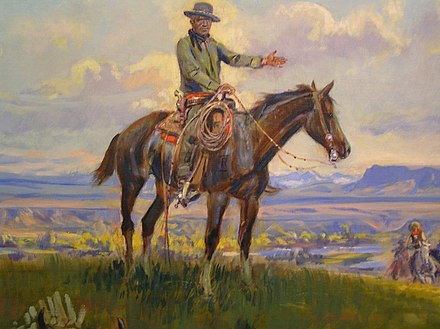Russell Country
Russell Country
Russell Country is a region of Montana. The name is inspired by famous western artist Charles Marion Russell known as 'the cowboy artist' for his romantic paintings of Montana and early western culture.

Cities
- Great Falls
- Choteau
- Fort Benton
- Lewistown
- Harlowton
- Havre
- Shelby
- Sweet Grass
- Sun River
- White Sulphur Springs
Other destinations
Chinook, Harlem, Rudyard, Chester, Conrad, Valier, Dupuyer, Fairfield, Augusta, Cascade, Ulm, Vaughn, Belt, Highwood, Big Sandy, Virgelle, Box Elder, Stanford, Geyser, Hobson, Utica, Shawmut, Judith Gap, Monarch, Neihart, Winnett.
Understand
Central Montana tourism region includes thirteen counties in Montana. The region has diverse geography from mountains to rolling plains and the mighty Missouri River. The noted White Cliffs of the Missouri are downstream from Fort Benton, Montana in a remote area that remains much the same as when the Lewis & Clark Expedition explored here over 200 years ago. Island mountain ranges, mountain streams and reservoirs are dispersed throughout the region. Great Falls is the largest city in Central Montana and is home to the C M Russell Museum, the largest collection of the cowboy artist's work. The Lewis & Clark Interpretive Center sits on the banks of the Missouri River in Great Falls and details the interaction between the expedition and the plains Indians. Recreation includes hiking, mountain biking, trout fishing, walleye fishing, birdwatching and horseback riding. Several entrances to the Bob Marshall Wilderness are located on the Rocky Mountain Front near Augusta and Choteau. Small towns dot the region known for cattle ranching and wheat and barley farming.
Get in
- Great Falls International Airport (IATA: GTF)
Get around
Getting to Central Montana is easy. I-15, US Hwys 2, 89 and 200 are major routes. There is a 24-hour port of entry into Canada at Sweetgrass, Montana on I-15 in the northern part of the region. Air service in to Great Falls is provided by Delta, United, Alaska (Horizon), Allegiant and Frontier (seasonally). Amtrak travels east-west in the northern part the Central Montana with stops in Shelby and Havre.
By bus
North Central Montana Transit (phone: +1 877-233-6268, 265-4762 local) provides bus service between Great Falls, Box Elder, Laredo, Havre, Chinook, Harlem and Fort Belknap. Fare is $1.00. The blue lines runs Monday through Friday. Other bus routs only run two or three times a week. Buses run one direction in the morning and then run the opposite direction in the afternoon.
Northern Transit Interlocal ( +1 406 470-0727), run by Toole County, serves Shelby, Conrad, and Great Falls, among other places. There are 6 routes connecting the towns. Each route only operates on select days.
See
In Great Falls see the Lewis & Clark National Historic Trail Interpretive Center, C. M. Russell Museum, Ursuline Centre, The History Museum, Paris Gibson Square Museum of Art and Rivers Edge Trail. First Peoples Buffalo Jump State Park near Ulm, MT is just 15 minutes west of Great Falls. In Havre see Havre Beneath the Streets, the Clack Museum and Wahkpa Chu'gn Buffalo Jump. Fort Benton has several museums, a reconstructed replica of the Old Fort and the Bureau of Land Management's Upper Missouri River Interpretive Center. Chinook has two museums, the Blaine County Museum which also is headquarters for the National Park Service's Bear Paw Battlefield and the Wildlife Museum. The Bear Paw Battlefield, site of the last major Indian battle in the United States and where Chief Joseph surrendered, is located just 16 miles south of Chinook. In White Sulphur Springs you can soak in the natural hot springs and visit the Castle Museum. East of White Sulphur Springs near Martinsdale is the Bair Museum, a rich repository of items collected by the daughters of Charlie Bair, area sheep rancher. Dinosaur history can be seen in Rudyard at the Rudyard Depot Museum, in Harlowton and the Upper Musselshell Museum, at the Blaine County Museum in Chinook, at the Clack Museum in Havre, at the Old Trail Museum in Choteau and at Two Medicine Dinosaur Center in Bynum. Two Medicine Dinosaur Center along the Rocky Mountain Front offers paleo digs where the public may participate for a fee.
Do
Walk, bike or rollerblade the River's Edge Trail that follows the Missouri River through Great Falls. Approximately 40 miles in length.
Eat
Drink
Stay safe
During the winter, smaller secondary roads are often closed entirely, and even the Interstate can shut down rapidly when the weather turns poor. Verify weather conditions and road status before setting out, and travel with emergency supplies. Unpaved roads are typically impassable for over half the year.